Travelling Docudays UA coordinators Maria Mendzhul and Maria Symkovych: “We work with children. They educate their parents”
Travelling Docudays UA coordinators Maria Mendzhul and Maria Symkovych: “We work with children. They educate their parents”
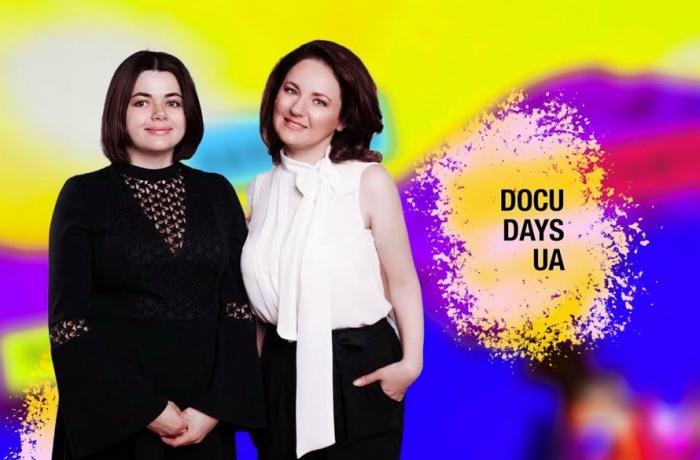
What helps Ukrainians to stop tanks with their bare hands? To fundraise millions for Bayraktar drones? The Travelling Docudays UA and Suspilne Culture have prepared ten stories about the resilience of Ukrainians which will help us find answers to these questions.
This is a conversation with Maria Mendzhul and Maria Symkovych, the regional coordinators of Docudays UA in Uzhgorod. They speak about ways to talk to children, when information is not ignored but provokes reflection, and about organising cultural events during COVID-19 and the war.
Maria Mendzhul is a PhD in Law, professor, deputy dean for research of the Law Department of the Uzhgorod National University, head of NGO Vested Carpathian Agency for Human Rights.
Since 2013, she has been a regional coordinator of the Travelling Docudays UA International Human Rights Documentary Film Festival in Uzhgorod. Since 2014, she has moderated the Docudays UA film club Alternative in Uzhgorod.
Maria Symkovych is a teacher of the Ukrainian language and literature, methodology counsellor at the Department of Education of the Uzhgorod City Council, coordinator of the KORZO student self-government of Uzhgorod, soft skills development coach, head of NGO Insider Education Center, member of NGO Vested Carpathian Agency for Human Rights.
Since 2013, she has been a regional coordinator of the Travelling Docudays UA International Human Rights Documentary Film Festival in Uzhgorod. Since 2014, she has moderated the Docudays UA film club Alternative in Uzhgorod.
“THERE IS A CHOICE” BECAME MY LIFE MOTTO
Maria S.: I remember my introduction to Docudays UA very well. It was October 2013, I began working at the Department of Education in Uzhgorod while also teaching at a school. I got a call from the head of the Department of Education who told me that a guy will come and bring posters for film screenings at schools and that I would be managing that project. A young man came and said he was from Vested, gave me the posters and the contacts of Maria Mendzhul, who was supposed to explain everything to me.
My first impression was that I really liked the posters and the festival’s topic: “There is a choice!” It got me thinking: what does it mean?
It is both about choice in personal life—there is a choice there, and about choice in social life—there is a choice there, and also about choice in political life—there is a choice! It has become my life motto. And thus, with those striking posters featuring armed special police officers with shields—some without heads, some with prosthetics instead of legs—my work with the Travelling Festival began.
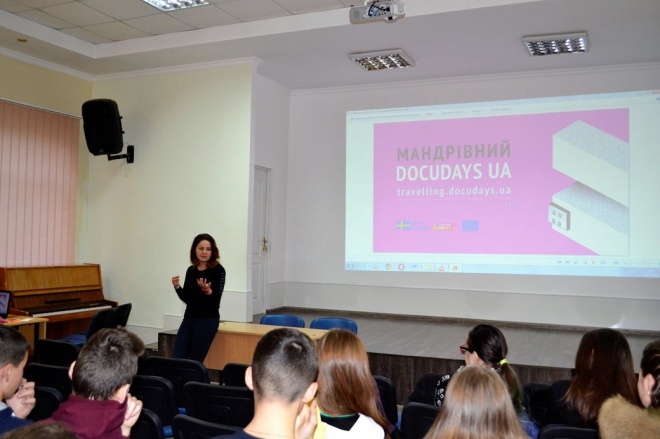
Film screening, 2018. Photo credit: Docudays UA
Maria M.: At first I showed films to the student audience, and later I also decided to work with school children as well. I went to the leadership of the Department of Education, was introduced to Maria Symkovych, and since then we organise the festival together for young people, school children, for everyone who wants to come. At schools the screenings are closed, and at the university we make announcements about open access to the room where we screen the films. Both students and other people of any age can come to us. And they do!
HOW WE LEARNED FROM OUR MISTAKES
You can’t force children to come to the Travelling Festival’s screenings.
Maria S.: We were always learning, particularly from our mistakes. Because I was working at the Department of Education, at first I sent out letters to schools: make sure to bring children to the film screenings. A kind of administrative influence: the first screenings were compulsory for the children.
But over time I realised it was ineffective, and we should not gather school children in big halls: they do watch the film, but there is no discussion, so there was no consideration or comprehension. And secondly, under no circumstances can children be forced to attend these events. They don’t even think about why they are shown all this, they just get an excuse to miss classes.
So all the following years of the festival I only invited those who were willing to come to screenings and discussions, to human rights events and exhibitions. Even if it’s just 10–15 children per school, they come consciously because they are interested in the festival’s subject and want to learn more about it. We started organising more screenings but in smaller rooms. And then there were actual effects from our work: children began to talk and think after screenings.
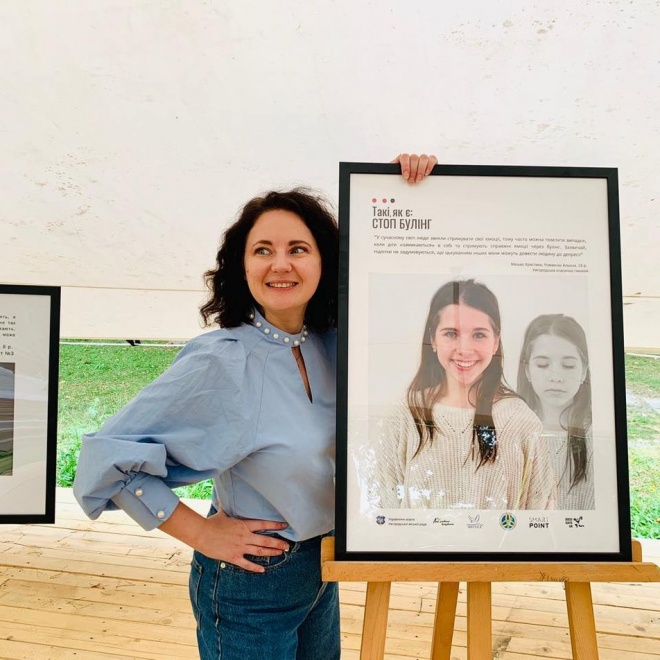
Maria Symkovych. Photo credit: Docudays UA
Maria M.: At first we had little experience, we had anxieties and lacked confidence. But students loved and accepted the festival from the first year. We experimented and showed films in all kinds of formats: at student libraries, at dormitories, at the big university administration hall for 500 people. Students from all departments came to the screenings, not just law students. At our festival, students grew up from year to year, starting from the first year and until graduation, they actively participated in organisation and became true friends of the Travelling Festival. Because it is an instrument not only for legal education but for cultural upbringing and developing an active civic stance.
WHAT HAPPENS AFTER FILMS
Maria M.: There was an interesting case. A few years ago the festival’s topic was 4 Degrees. We screened the film Death by Design at the grammar school and invited students from several nearby schools. The film was about how chasing new trendy cell phone models and other devices harms the environment.
In the film, the authors showed heaps of garbage made of smashed devices and microchips and talked about how the process of manufacturing and using all that pollutes the environment. The children were astonished, and at the discussion they said: “We didn’t know about this,” “Now I’m not going to chase the latest cell phones,” “Let’s not try to catch up with fashion, let’s use our cell phones longer.” I’m sure that the children will remember the film their entire lives.
Maria S.: The same year we screened Thank You for the Rain, a film about Kisilu, a farmer from Kenya who uses his camera to record the life of his family, his village, and the effects of climate change. He filmed floods, droughts and storms, but also more human losses: his children were sent home from school when he could not pay for their education; men were moving to cities in search of jobs; tensions in the family were growing. After a storm that destroyed his house, Kisily started organising a social movement of farmers fighting against the impact of extreme weather, and he takes his story as far as Paris, to the UN Climate Change Conference. After this screening, we came up with the project Childhood Without Garbage, which lasted for 2 years. We organised many waste sorting events with the children, students arranged peer-to-peer classes where high school students taught middle schoolers how to sort garbage.
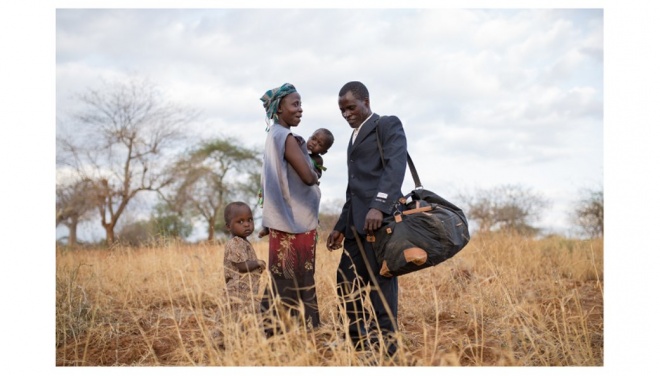
Photo credit: Docudays UA
We hold some events in locations that resonate with the topic of the film. If it is a film about a castle, we go to the castle and have an event there, involving the castle employees. When we were planning a screening of The Winter Garden’s Tale, we decided to do it at the Botanical Garden. After the screening we realised that the film was relevant not only for Kyiv, it felt like it was about the Botanical Garden in Uzhgorod.
Our garden here is in a sorry state, it has minimal funding, its workers are mostly very elderly, aged 70–80. They have been working there since it was established, and the garden is their life. The film, the event, and the Botanical Garden inspired the children so much that we still work with its employees, we go there with our students occasionally to clean up, work the land, help the guardians of the garden.
FROM OFFLINE TO ONLINE
Maria M.: When the world moved online due to COVID-19, we were anxious that we would not be able to manage the festival. But by autumn, when the Travelling Festival was supposed to start, young people had already adjusted to living online, and it was a success!
For example, the Living Library where you can talk in person with “living books”—that is, people who face prejudice in society. We had been organising the “library” offline for several years, but that year it was in a new format.
One of the “books” was the well-known Ukrainian language activist and blogger Danylo Haydamakha, a young man of 22. He is from Kyiv, but he spent a lot of time in Crimea where his parents are from. He grew up in a Russian-speaking environment. At 16 he decided to switch to Ukrainian, and his parents supported him. Now he uses his videos to inspire people to learn Ukrainian and speak Ukrainian.
Our students are fascinated by his work, so there were many people who wanted to talk to the “book,” he was very popular. And it just so happened that when we called Danylo, the band KAZKA were rehearsing in his apartment, so our participants could also listen to their favourite musicians. There were two other “books,” one was a civil activist with a disability, she has vision impairments. She spoke about her life and about the difficulties she had to overcome. And the third “book” was the well-known Uzhgorod writer Bandy Sholtes.
But there were also regrettable surprises during online screenings, attacks by haters who invaded our events. They swore, turned music on, tried to disrupt screenings and discussions. In these cases we had to focus and respond in an instant. We managed it.
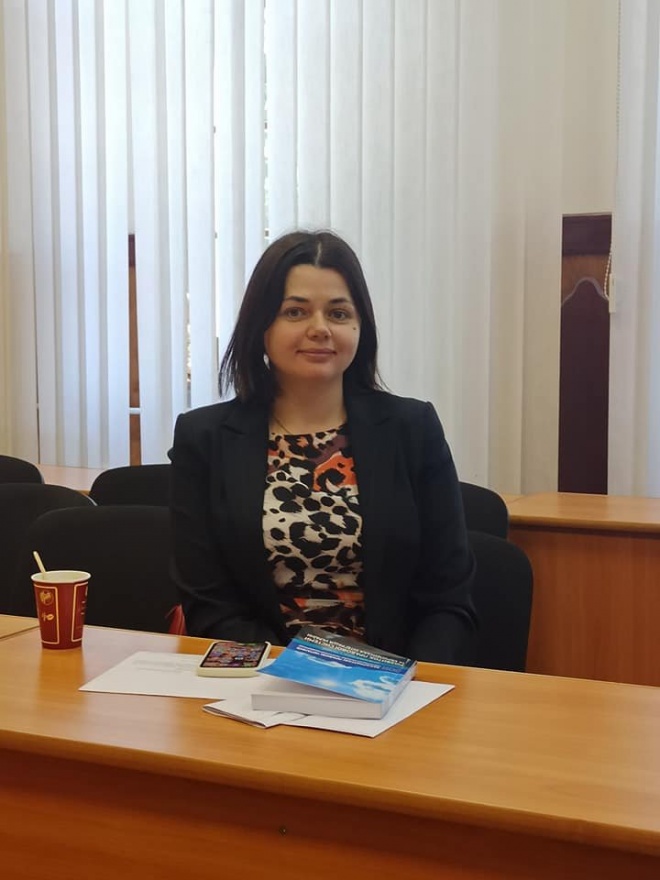
Maria Mendzhul. Photo credit: Docudays UA
WE MADE DOCUDAYS UA RECOGNISABLE IN UZHGOROD
Maria S.: Through children we influence their parents. After films and discussions students come home and share their thoughts, emotions, and then their parents come to our evening screenings. And they also become our activists.
We have seen the results of our work, and we made it our goal to make the festival recognisable in Uzhgorod, so that our audience look forward to October-November-December, to make the Docudays UA brand significant to them. And I think that in 9 years we have reached this goal, because children start asking in September if the festival is going to happen this year. And those who watched films at the first festival screenings have already grown up and volunteer at the Travelling Festival, helping us organise it and bring in new audiences.
AFTER THE VICTORY WE WILL BE ABLE TO TALK TO CHILDREN ABOUT THE WAR
Maria M.: On the first day of the full-scale war, 24 February, I packed a bag and then set it aside, because I decided that before Russian troops reach Zakarpattia, I will be able to do a lot for people. I started at the border, making sandwiches together with other activists, brewing tea, taking water to people waiting in line at the border. There were queues up to four kilometres long. This lasted for two weeks.
Then the City Council opened the Owl’s Nest hub, there weren’t enough volunteers, so I went to work there. We sorted the aid that people brought: mattresses, pillows, blankets, food, personal hygiene items. All of that was brought by people from home, because at first there was no humanitarian aid from abroad.
Then the volunteer centre at the university opened. We registered an NGO, the Uzhgorod National University Voluntariat. The university’s dormitories accommodated about 2,000 IDPs at that point. They needed help: food, legal consultations. Then we realised that we did not have enough capacity and applied for the Renaissance Foundation. We were supported, and we provided 1,000 families with food packages and stationery for the kids.
Thanks to the Warm City programme, we bought 200,000 UAH’s worth of household appliances for dormitories: fridges, washing machines, small appliances. Thanks to volunteers, we helped the Mariupol Theatre company, some of whom now live in Uzhgorod. There are 16 people, but more actors from Mariupol will arrive soon. They are already working at our regional theatre, they do plays and prepare for a tour.
We also help Roma communities, displaced Roma people. In summer, we organised a school for displaced Roma children, showed them documentary footage and historical photos about the escape of Roma people from the Nazi genocide. The children later said that right now the events in occupied cities and towns unfold the same way as many years ago: their homes have been destroyed, they fled from the occupiers in train cars where they had to stand the whole trip.
Maria S.: There has been a lot of work since the beginning of the war. I helped sort things at the Red Cross, welcomed IDPs around the clock and helped them find accommodation. Later, when humanitarian convoys started arriving in Ukraine, there weren’t enough hands to unload the cargo, sort the medicine and the aid.
As I was receiving IDPs, I noticed how the children were shut off, kept to themselves, they barely spoke. And in March I already began doing workshops separately for small kids and for high schoolers. It was rather hard to work with teenagers, they did not want to talk about what they had experienced, and generally they spoke very little.
And I came up with the idea to artificially create an image of a regular routine for them, just like before: school, communication, drawing, the sun was shining, life was going on. Not a single mention of the war. Gradually the children started opening up, but the sadness in their eyes is still there.
It is hard for me to recall this. We need some time to pass after Ukraine’s victory, and then we will be able to talk about this with children.
Interview recorded by Tetiana Kulyk












